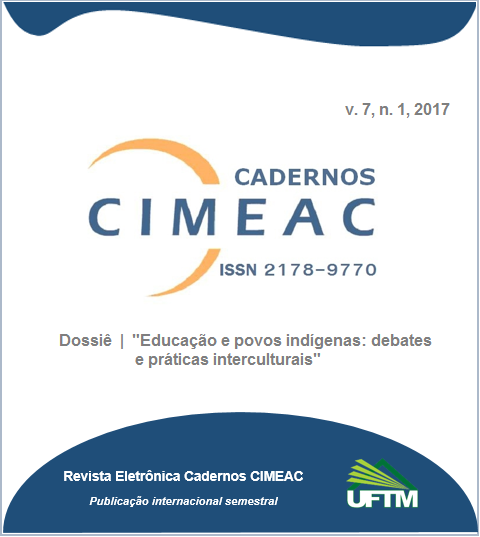Implicações do multinaturalismo na educação ambiental / Implications of multinaturalism on the environmental education
DOI:
https://doi.org/10.18554/cimeac.v7i1.2080Resumo
Perspectivas de mundo são condutas para interagir com as diversas formas de vida no ambiente. Baseado nisto, a temática a ser discutida traz consigo pensamentos para perceber o ambiente pela ótica indígena, em detrimento da ocidental etnocêntrica, e assim articular a ideia do perspectivismo ameríndio como abordagem reflexiva ao entendimento e discussão de questões socioambientais em voga no atual cenário do contexto educativo brasileiro. Dessa forma, partiu-se do debate antropológico a fim de abordar o etnocentrismo, o multiculturalismo e o perspectivismo ameríndio para compreender a discussão acerca da relação Cultura e Natureza. Na sequência, tem-se uma reflexão sobre a concepção multinaturalista ameríndia para desfazer a dicotomia Cultura e Natureza, e com isso pensar nossas interações e relações com outros seres vivos e o ambiente pela ótica ameríndia e suas considerações ecossistêmicas como constructo para uma abordagem educativa. A partir do perspectivismo ameríndio ou multinaturalismo tem-se a possiblidade de exercitar outra percepção do mundo, e suas formas de interações entre seres vivos no ambiente. Trata-se, portanto, de pensar para além do egocentrismo, e com isso compreendermos que somos apenas mais uma espécie na terra, entre outras milhares.
Palavras-chave: Perspectivismo; Educação ambiental, Cultura e natureza; Percepção.
ABSTRACT: World perspectives are conduits for interacting with the various forms of life in the environment. Based on this, the theme to be discussed brings with it thoughts to perceive the environment from the indigenous perspective, to the detriment of the ethnocentric Western, and thus articulate the idea of Amerindian perspectivism as a reflexive approach to the understanding and discussion of socio-environmental issues in vogue in the current context scenario Education. Thus, we started with the anthropological debate in order to approach ethnocentrism, multiculturalism and Amerindian perspectivism to understand the discussion about the relation Culture and Nature. A reflection on the Amerindian multiculturalist conception to undo the dichotomy of Culture and Nature, and with it, our interactions and relations with other living beings and the environment from the Amerindian perspective and its ecosystemic considerations as a construct for an educational approach. From Amerindian perspectivism or multinaturalism one has the possibility of exercising another perception of the world, and its forms of interactions between living beings in the environment. It is therefore a question of thinking beyond egocentrism, and with this we understand that we are just another species on earth, among thousands.
Keywords: Perspectivism; Environmental education; Culture and nature; Perception.
Downloads
Publicado
Edição
Seção
Licença
Os autores que publicam nesta revista concordam com os seguintes termos:
(a) Não cobramos dos autores para a publicação neste periódico.
(b) Autores mantém os direitos autorais e concedem à revista o direito de primeira publicação, com o trabalho simultaneamente licenciado sob a Licença Creative Commons que permite o compartilhamento do trabalho com reconhecimento da autoria e publicação inicial nesta revista.
(c) Autores têm permissão e são estimulados a difundir e a distribuir a versão publicada de seu trabalho online (ex.: em repositórios institucionais ou na sua página pessoal) após o processo editorial, já que isso pode aumentar o impacto e a citação do trabalho publicado (Veja O Efeito do Acesso Livre).
* * *
AUTHORS COPYRIGHT AND PUBLISHING RIGHTS
Authors who publish with this journal agree to the following terms:
(a) This journal does not charge authors for publication.
(b) Authors retain copyright and grant the journal right of first publication with the work simultaneously licensed under a Creative Commons Attribution License that allows others to share the work with an acknowledgement of the work's authorship and initial publication in this journal.
(c) For authors whose articles have been accepted: authors are permitted and encouraged to post their work online (e.g., in institutional repositories or on their website) after the publication of the text in Cadernos CIMEAC, as it can lead to productive exchanges as well as earlier and greater citation of published work (See The Effect of Open Access).


 10.18554/cimeac
10.18554/cimeac


